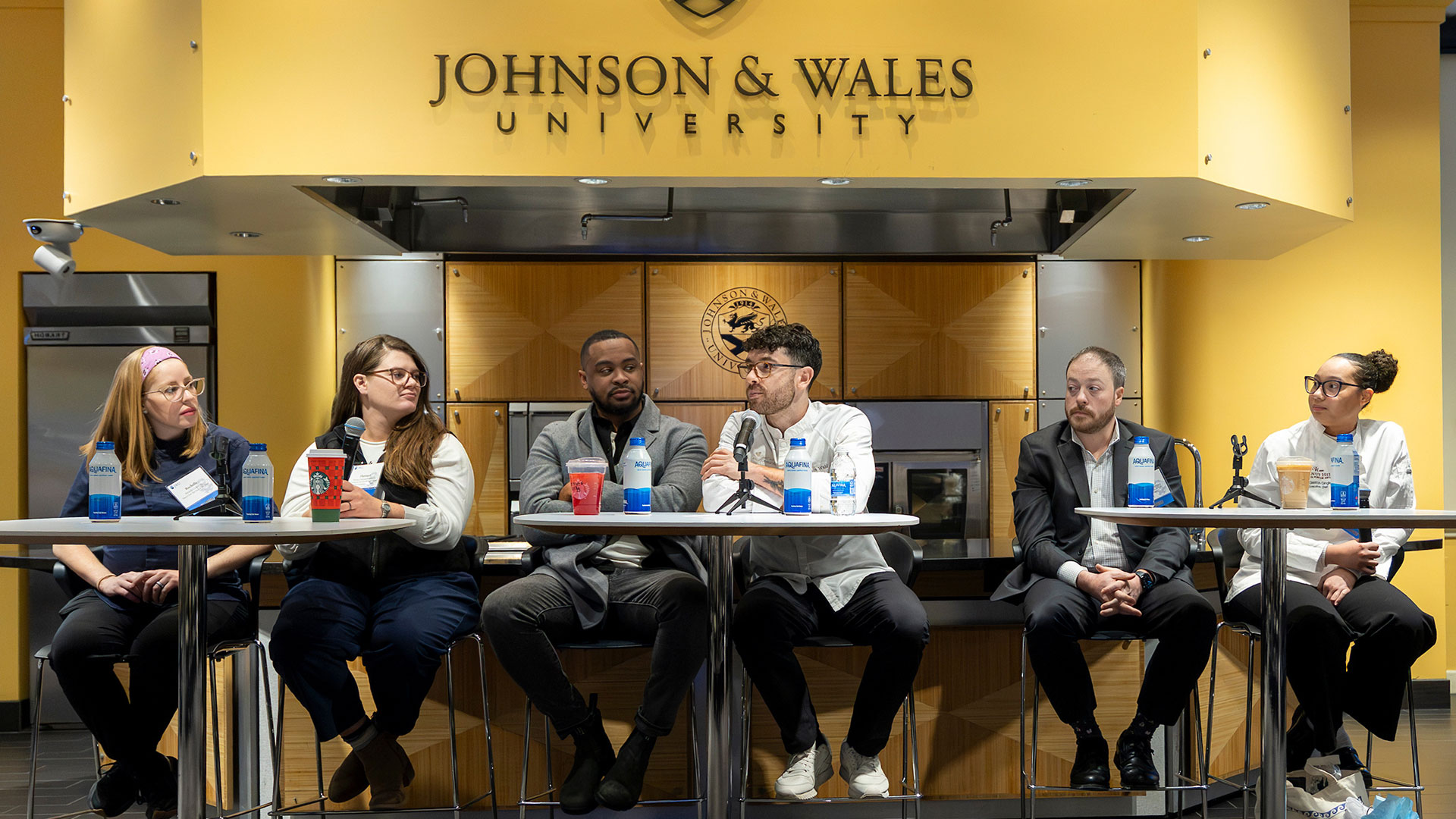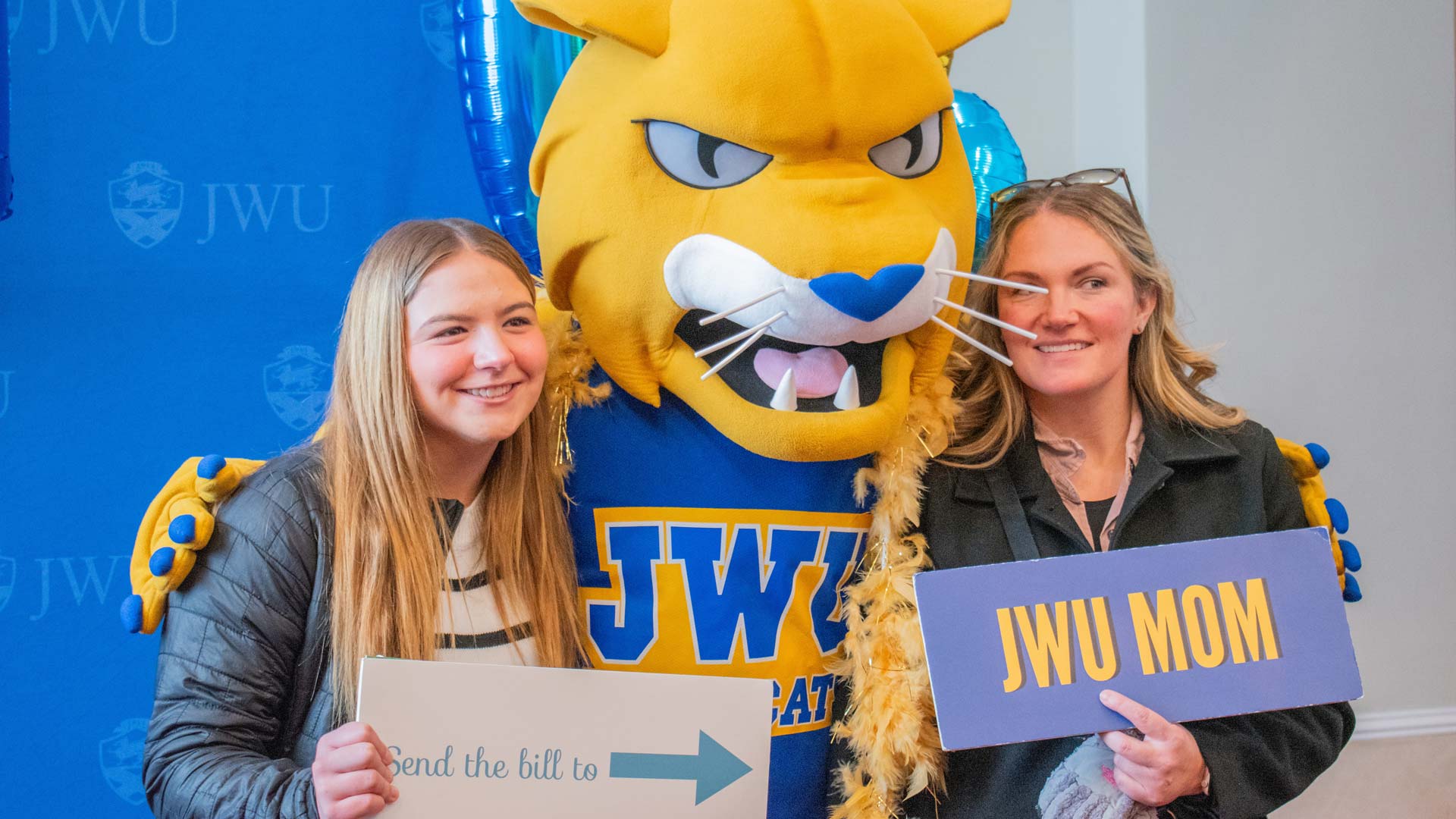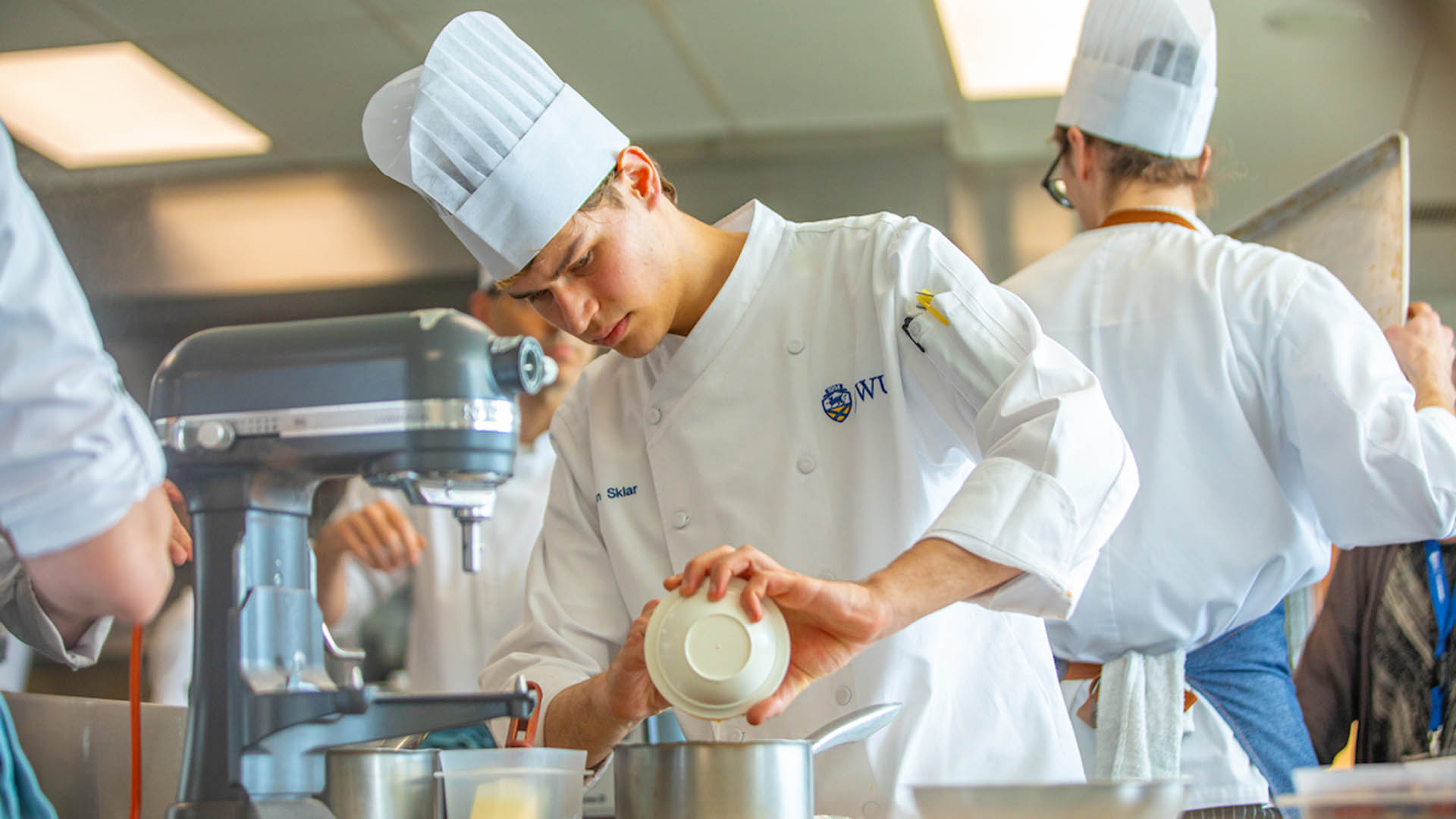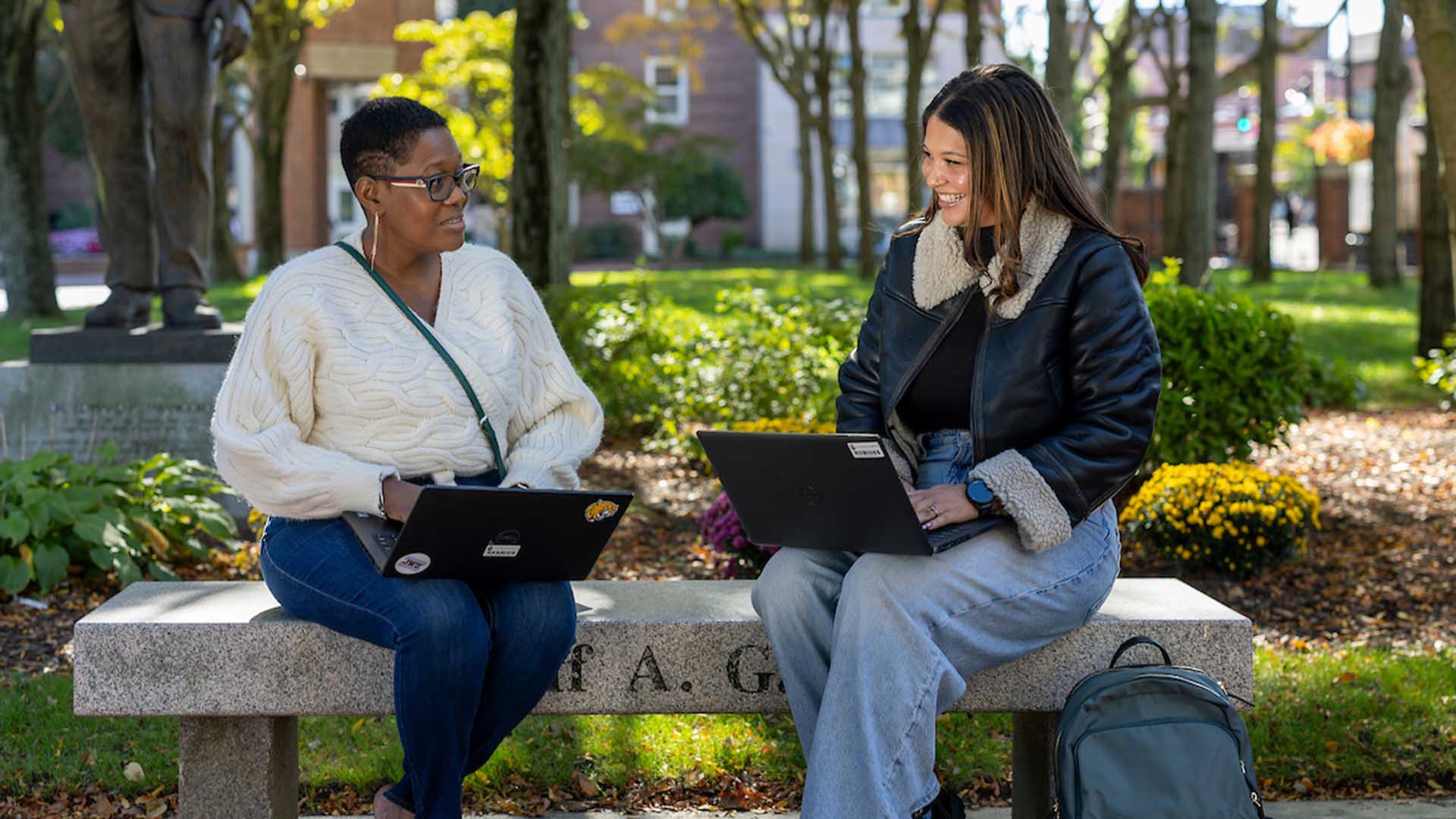Fighting Food Insecurity
The fight against food insecurity is a global one, with no single solution. According to a 2021 report by the USDA, nearly 34 million people in the United States are considered food insecure — meaning they lack consistent access to enough food for an active, healthy life.
Students, faculty and staff at Johnson & Wales University are working together to raise awareness on this issue, while also providing tangible resources for university members across both campuses and to the wider community.
College of Food Innovation & Technology Care Cupboard
In fall 2022, the College of Food Innovation & Technology launched its CFIT Care Cupboard on the Charlotte Campus. The cupboard is in the Academic Center’s Commuter Lounge, where students can drop by in between classes to pick up food items that are housed in a refrigerator. From macaroni and cheese, to soup, salad, pastries and more, items are individually packaged, allowing students to quickly grab and go between classes. During the month of October, 1,050 items were shared with the campus community.
The food is sourced from CFIT’s daily production. Leading the charge is Department Chair and Associate Professor Jennifer Gallagher. She says the college is committed to sharing production from all labs, when available, to address food insecurity on campus.
“Food insecurity is a widespread problem impacting students, households and communities.”
“We opened the CFIT Care Cupboard in direct response to feedback we received from students and observances by faculty and staff. Food insecurity is a widespread problem impacting students, households and communities,” Gallagher said. “Since its launch, we’ve been supplying roughly 40 to 60 units a day, and it’s helping those in need. The goal of this new initiative is to target students who are food insecure, can’t afford a full meal plan or to go to the grocery store. We want to make sure our students have something to eat. This provides students with the nourishment needed to be present and successful in class. Student retention is affected by affordability and their ability to get essential items,” Gallagher said.
At the end of culinary and baking & pastry labs, instructors will inform Gallagher if there is product available. From there, she and a team of faculty members and culinary assistants will properly package the product and fill the refrigerator for another day. They update the sign posted on the appliance door that indicates what items are inside for pickup.
In October 2021, Johnson & Wales University Charlotte received a five-year, $1.25 million grant from the United States Department of Education. Allocated funds from this awarded Title III PBI (Predominantly Black Institutions) project help to cover the cost of packaging food items for the CFIT Care Cupboard.
Read More >>> Sorority Student Focuses on Giving Back
Wildcat Food Rescue Club
CFIT faculty members Joe Melanson '94,'96 MAT and Tim Brown are the club advisors for the JWU Wildcat Food Rescue Program on the Providence Campus. This is another way JWU is addressing food insecurity.
After labs, the club advisors collect leftover food and with the help of students create meals using those ingredients. From there, they create a QR Code menu for people to view meal items that are available to pick up at no cost. The campus provides meals on Thursdays in conjunction with its weekly bake sale. The program first launched in fall 2021.
“We are really passionate about food waste. Not so much the waste, because there will be waste in production of food, but the recovery of the consumable or usable food,” said Brown.
Once the program launched, Brown and Melanson realized it was a true need on their campus.
“I think that initially when we started this we were talking mostly about compost, but then we heard of some students on our campus that were having issues with food,” Melanson said.
Over the course of six weeks, the campus can convert leftover food from CFIT production into nearly 1,000 meals.
Food Pantries
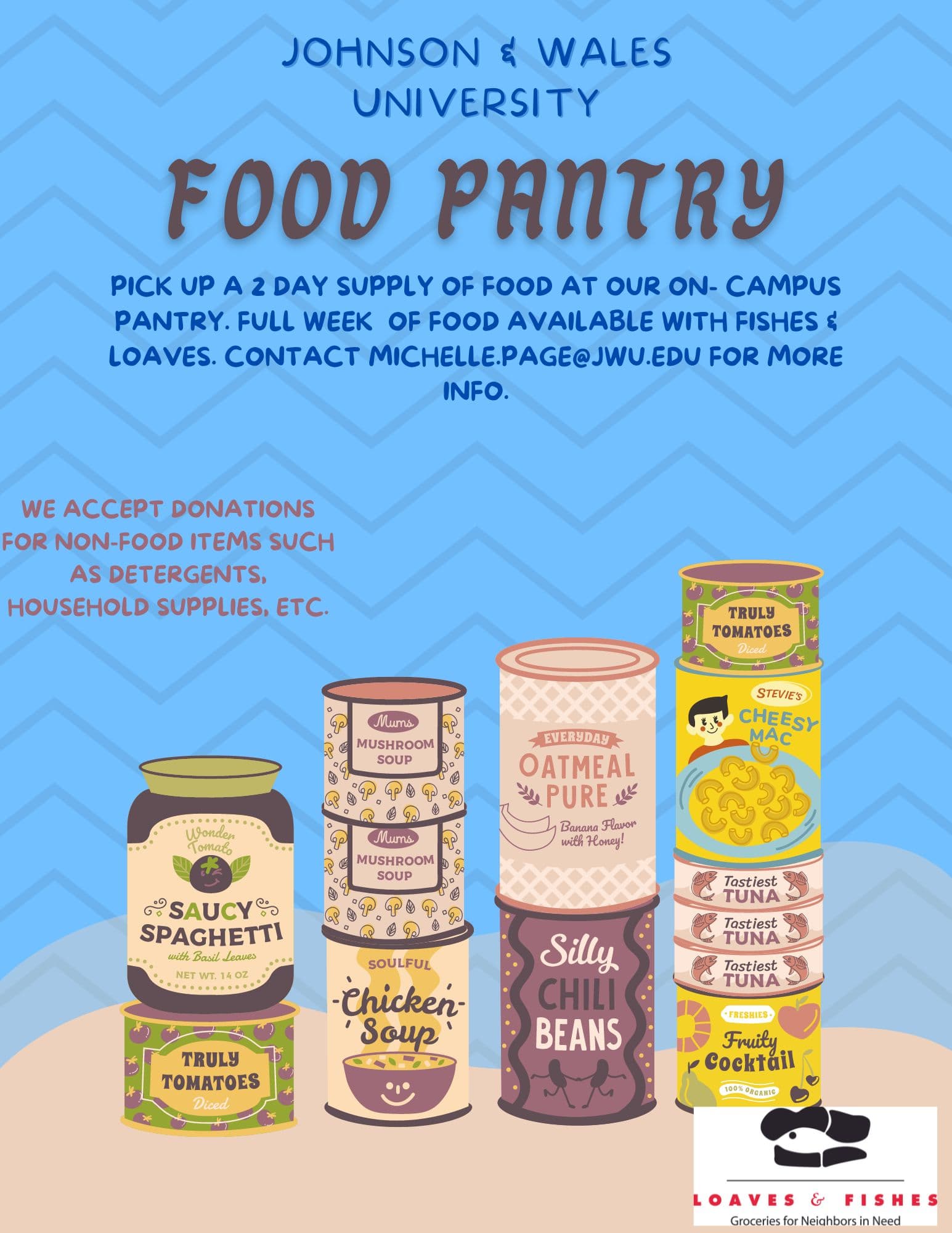 Since the Charlotte Campus launched its food pantry in spring 2020, dozens of students have utilized this program. Nonprofit Loaves & Fishes drops off food items regularly to keep the campus pantry stocked. The pantry is a joint effort between Student Affairs and Health and Counseling Services. Students schedule an appointment with Health and Counseling Services’ Administrative Assistant, Michelle Page, to pick up items.
Since the Charlotte Campus launched its food pantry in spring 2020, dozens of students have utilized this program. Nonprofit Loaves & Fishes drops off food items regularly to keep the campus pantry stocked. The pantry is a joint effort between Student Affairs and Health and Counseling Services. Students schedule an appointment with Health and Counseling Services’ Administrative Assistant, Michelle Page, to pick up items.
“Students typically reach out to me through email, and we arrange a time to meet. As a university, we are working to make sure we help our students at every point in their educational journey and nutrition is very much a part of that,” Page said. “The campus food pantry gets students connected with the resources they need, whether that be short term or long term. If students present a greater need past the two-day supply our campus program offers, we refer them to our campus food pantry partner, Loaves & Fishes, who can help them with long-term arrangements.”
The Providence Campus has a small, non-perishable food pantry located in the Downcity Campus. It launched in fall 2019 and is operated by Mathematics Department Chair, Evelina Lapierre. The pantry is always accessible on the fifth floor of the TACO Center for Business Arts & Sciences.
“Students can take as much or as little as they wish,” Lapierre said. “It is important that students know that they are seen and supported by the university.”
Educational Awareness
College of Arts & Sciences Associate Professor Lisa Kendall launched a Global Food Security course at Johnson & Wales University. Now in its fourth year, the fall class focuses on how to identify food insecurity and ways to address it.
“We look at food insecurity and the system globally. There are no easy answers, cures or fixes to this problem. We examine how all aspects impact the food systems — how systemic issues such as inflation, food deserts, COVID, the war in Ukraine and policy have a direct correlation,” Kendall said.
“There are no easy answers, cures or fixes to this problem.”
In addition to coursework, enrolled students volunteer with hunger organizations. In the past, the university has partnered with Second Harvest Food Bank, The Bulb and Rosa Parks Farmers Market. These food advocacy organizations have welcomed JWU students to work alongside them to support their mission of moving people toward food security.
The course also hosts a Hunger Awareness Event to educate university members on food insecurity. The event provides educational resources and activities. It also includes a collection drive for food and necessities.
“The annual Hunger Awareness Event helps our campus community see the reality that they may be sitting in class with those who are food insecure,” Kendall said. “How well do we learn when we’re hungry? Food insecurity impacts the ability to learn. While there are a lot of things that are out of control there are some things we can do to help and this event, this course, are examples.”
JWU’s educational approach to addressing food insecurity doesn’t stop here. As previously reported, JWU Providence was recognized by the Environmental Protection Agency (EPA) for its efforts to reduce food waste by working with a local pig farmer to compost discarded food from culinary buildings and dining halls. The school also donates prepared food to Elisha Project’s Food Rescue program, which then distributes it to those in need. Labs also frequently host free family-style dinners for fellow students who might themselves be confronting food insecurity.
